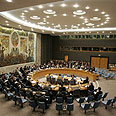
UN Security Council (Illustration)
צילום: איי פי
Arabs battle West over free speech at UN
Muslim nations meet opposition from EU, US in proposing restrictions to be imposed on negative comments about Islam. US: 'Resolution attempts to legitimize criminalization of expression'
On Tuesday Arab and Muslim countries defended a resolution they pushed through at the United Nations, to have the body's expert on free speech police individuals and news media for negative comments on Islam.
The United States, Canada and some European countries criticized the role reversal for Kenyan legal expert Ambeyi Ligabo, who has reported to the global body on measures by dictatorships and repressive governments to restrict free speech. The US and other Western nations warned that the Muslim-backed resolution at the UN Human Rights Council could curtail freedom of expression and help dictatorial regimes block dissenting views.
"The resolution adopted attempts to legitimize the criminalization of expression," Warren W. Tichenor, the US Ambassador to the UN in Geneva told the 47-nation body. According to Tichenor, the statement proposed by Egypt and Pakistan, which passed 32 to zero last week at the council, seeks to impose "restrictions on individuals rather than to emphasize the duty and responsibility of governments to guarantee, uphold, promote and protect human rights."
The resolution was the latest move initiated by the Arab and Muslim countries dominating the council to protect Islam from religious hatred and defamation. In defense of the resolution they cited the 2006 incident in which a Danish magazine published caricatures of Muhammad. They also referred to the Pope's recent controversial comments on the religion, and the recent release of 'Fitna', the anti-Islamic Dutch film.
From protection to limitation
Slovenia's ambassador, Andrej Logar, speaking on behalf of the European Union, warned that Ligabo's role as an independent expert was shifting from protecting free speech toward limiting it. Ligabo said in an interview last month that he was against any incitement of hatred based on religious belief. "But," he said, "We advocate the rights of individuals, not of a particular belief or ideology."
Pakistan's ambassador, Masood Khan, speaking on behalf of the 57-nation Organization of the Islamic Conference, denied the resolution would limit free speech. "It only tries to make freedom of expression responsible," he said.
Paris-based Reporters Without Borders condemned the amendment. "It turns someone who is supposed to defend freedom of opinion into a prosecutor whose job is to go after those who abuse this freedom," the organization said.










